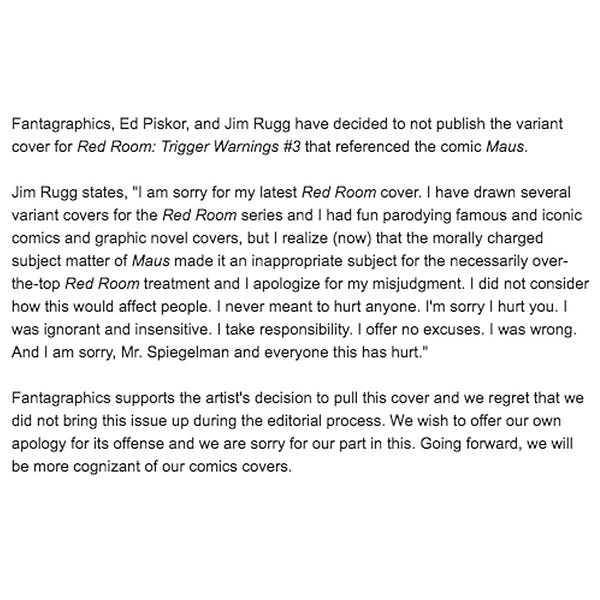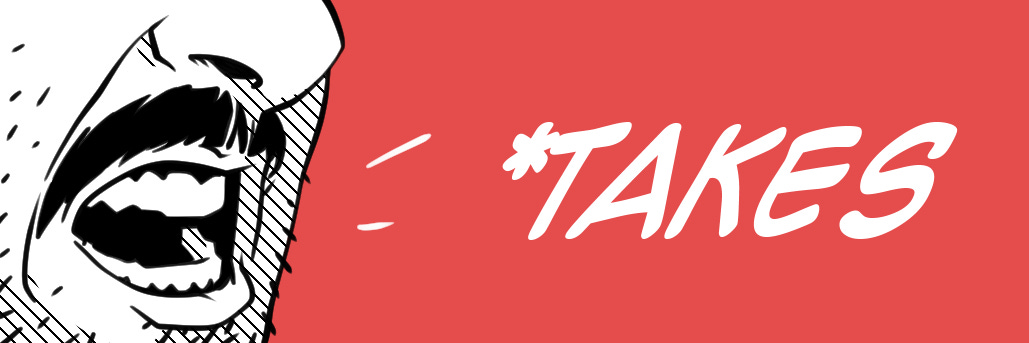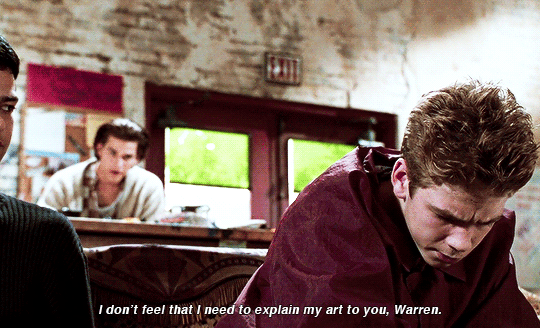TAKES: On apologies
Should artists apologize for their work? Increasingly, I think the answer is, "for what?", and then, probably, "no."
Hey folks.
I have a few thoughts on the Ed Piskor/Jim Rugg controversy that’s been going around.
I haven’t seen anyone raise the objections I’m about to raise, and after a few side-conversations with other creators, I think I’ll stick my neck out a little here.
Buckle up for a long one.
The Controversy
If you haven’t caught it, here’s the TL;DR:
For their book Red Room, Piskor and Rugg created this cover in clear reference (or homage, or whatever-you-want-to-call-it) to Art Spiegelman’s Maus.
It caused a controversy and the publisher decided to pull it, announcing so alongside this full-throated apology from Jim Rugg (apparently the cover was his baby):


You can click through if you want, but what you’ll see is the kind of polarized reactions we’ve become accustomed to when this kind of thing happens.
That is, a lot of people who are confused about what the offense is, versus a lot of people who think the apology isn’t enough, or too little too late, and that Piskor/Rugg/et al still have a lot of work to do to make things right.
Elsewhere, there’s no shortage of commentary from various comic critics and prominent (and I mean prominent) creators criticizing Piskor and Rugg. This cohort includes comics creators at my level (that is, the low level) through what I’d maybe call the Vault level (i.e., landed their breakout book), even up to DC and Marvel.
I don’t want to hyperbolize the content of those criticisms. But overall, the heat is as much leveled at the creators themselves as the art in question.
Overall, two camps seem to have emerged here, and they are, roughly speaking:
Fans who see the cover as a lapse in judgment at best, but don’t think an apology or retraction are warranted.
Critics and other comics creators who think Piskor and Rugg are trash assholes and always have been, and if you don’t see that, there’s no helping you.
I haven’t read Red Room. Aside from watching the occasional Cartoonist Kayfabe and reading X-Men: Grand Design, I can’t say I’ve supported Piskor’s work. I respect his passion for the craft and artistic philosophy. I know next to nothing about Rugg.
From what I’ve gathered about Red Room, it’s a kind of shlocky grindhouse exploitation comic about the internet. That’s a valid genre and a novel concept, and one where I’d expect to find content that is provocative, shocking, and yes, even cringe.
This seems to be exactly the kind of book they set out to create. It’s not personally my thing, but in principle, I fall on the side of the confused cohort.
But the disquieting thing to me is that I seem to be completely alienated from other creators on this (though I also suspect many are with me on it and just don’t want to speak up to avoid the hassle).
All of this is important context for later.
First, some observations about our habits around controversies in this space.
Bad Habits
These fights, over “free speech” or “cancel culture” or “accountability” (I’m not getting dragged into semantics here, call it what you want) are not merely increasingly fraught, but also, increasingly predictable and boring.
Somewhere, every couple of days, Pavlov’s Bell rings, and the first person to hear it starts a chain reaction. What follows is a sort of game of Controversy Telephone.
The language in this game is tricky, loaded, and lazy.
A typical example might sound like, “Obviously this is bad, what were they thinking, who approved this, did no one object.”
This is weasel argumentation. Notice how you don’t even need to make an actual point because if something is obviously bad, there’s nothing to discuss.
If Person A says “well obviously he should get the death penalty, he killed someone,” there’s not really a lot of wiggle room for you to object in that kind of formulation without Person B immediately accusing you of being “pro-murder.”
And for the few brave fools who decide, hell with it, I have something to say, well, Person B is ready for that move, too. That’s when you get QRT’d and mocked by them and their followers (i.e., precisely the kind of hassle people try like hell to avoid online).
So to summarize, the formula that passes for discourse right now is:
Here’s what to think, if you don’t see it, there’s something wrong with you
Oh, you don’t see it. Hey followers, look at the fucking idiot!
Like I said, predictable and boring.
It’s a bad argumentation habit. And hey, I’ve been guilty of it in the past myself! It’s hard to resist. It smashes that happy button in your brain.
But it also stops you from thinking. And the bad habit is concluding that you don’t need to. Someone is telling you, here’s what to think, here’s what it means. If you can’t see that, something is wrong with you. That’s the language we speak in now.
And what’s missing from this toxic little dance?
An argument. A point. A single idea.
I don’t see anyone offering an explanation of what exactly is the thing that is the cause for offense here. But to give a good faith guess, it seems like, at best, it’s probably, “you shouldn’t homage something with the gravity that Maus has for your shlocky grindhouse exploitation project. It’s in bad taste.”
That’s fine. I gave my take on that above, but it’s moot. I’m not here to tell people they can’t be offended or be critical.
I’m here to talk bad habits. Specifically, bad habits that make this community more toxic.
Intent vs. Interpretation
One of the biggest I see around these kinds of conflicts is the bad habit of telling people what the artist is really saying.
But here’s the thing.
If you think that an artist is really saying X, that doesn’t make it the truth. It’s your interpolation onto the art.
That’s what you think it means.
You don’t know what the artist means.
Maybe the artist isn’t trying to sneak something hypnotically evil past the gate. Maybe it’s not some secret code or dogwhistle.
Maybe they were just… trying to be provocative for the sake of it. Or maybe they are trying to make a genuine point, and it just falls flat. The sin is of poor execution.
I don’t know. And I know for a fact that you don’t either.
The relevant point is this: you don’t get to canonize your interpretation for the rest of us. There is no “first” to figure out what the art or the artist really mean.
Now imagine yourself in a situation where you genuinely make an honest mistake, and you apologize. But the community around you has decided that what they think you meant is reality. What you think about what you did, what your intentions actually are, aren’t even part of the story anymore. They don’t count.
You’re the artist. And your contribution doesn’t matter.
Can you appreciate how patronizingly insulting this is? That you don’t even know what you’re doing? You’re too stupid and irresponsible to make art by yourself without some shmuck on Twitter signing off first?
To hell with those kinds of people. I don’t take them seriously and I don’t respect them.
There’s a difference between saying, “I find this offensive or tacky and here are my reasons,” and telling people “this is what this means, period. For everyone. And if you don’t get that, there’s something wrong with you.”
You can do the former. You don’t get to do the latter.
Answering Some Critiques
I talked with some other creators on a different side of this issue from me and got some valid critiques.
For the most part, the pushback to my line of thinking came down to: “Yeah, but, people have a right to be critical, that’s part of the discourse too.”
Fair point.
BUT.
What I want to see is a more open discourse. Not even necessarily a more healthy and respectful one. I don’t mind it being pugilistic, I just don’t want bullies to set the terms of the discourse and then elbow everyone else out. I want it to be fair.
Does anyone think open discourse happening here?
Is there a critical side, and a side trying to give Piskor and Rugg the benefit of the doubt, and another side defending the art even if they don’t like it because of principle, etc., etc.?
Seems to me like there’s only one side, the “obviously this is wrong and if you don’t see it, I can’t help you,” side. They set the terms, they’re sucking up all the oxygen. If you stick your head out to push back, it gets chopped off.
Is that an environment in which you want to admit to a mistake?
To me, it more resembles a kangaroo court staffed by goons and thugs.
That’s not open discourse. No one is learning anything, no one is fostering healthy relationships, no one is gaining understanding of someone who isn’t like them, no one is genuinely and curiously reflecting on the error in their ways. No one is becoming a better “ally,” whatever that even means on the spectrum from “friend” to “hostage.”
That’s not a community that is getting stronger. It’s a community that is getting weaker.
“Yeah but the comics community has always been fraught and fiery.”
This is true; I remember what the letters to the editor looked like in the 90s when someone would decide to make Hal Jordan a bad guy or Spider-Man a clone.
But I think the relevant difference today, and indeed my primary point of contention, is the impressive volume of not readers nor critics but comics creators showing up for a pound of flesh.
The Artist’s Veto
You should know where I’m coming from here.
On the question of artistic expression, I’m an extremist. A radical.
I want art and culture as open as they can possibly be, and I think as artists we should support an open level of expression on principle (yes, even when it makes us cringe).
It’s not an opt-in thing. It comes with the gig.
There are many reasons I think this, but one of the foremost is that I don’t think that art can actually be gatekept. It’s like trying to stab a wet noodle. And the people who find themselves gatekeeping art aren’t usually themselves artists. They’re dry, unfunny, and boring, whether we’re talking about evangelical Christian moms of the 90s on this end of the spectrum or this puritanical form of online progressivism we see today.
Gatekeeping is an act of censorship. And artists who censor are, frankly, dirty cops.
I call bullshit on them.
I’m not arguing that art needs to be chaos. I align with the reality that art is chaos, and it deserves to be free. That means free to be beautiful, free to be offensive, free to be bawdy, and even free to be clumsy.
I think artists should be more aggressive in defending themselves and each other on this principle.
I don’t know when it happened, but I know we didn’t all agree to it — this unwritten rule (probably pulled from the Twitter hivemind’s ass) that artists are meant to be meek little lambs silently wandering the abbatoir. That we can’t respond to criticism.
I call bullshit on that.
Sure, this one can get a little nuanced. I don’t think that artists should seek out their smallest critics and challenge them to boxing matches (not because I think it’s wrong, mostly because it’s a waste of your time and skills, and you should be at the board).
I also believe in a genuine separation of church and state between artists and the critics of their medium.
I know and respect a lot of comics critics. If they wrote negatively of my work, I would accept it silently. They have a job, I have a job, I respect the job. There will always be a tension there and that tension is healthy.
Artists cross a line when they openly pick a fight with their critics. Where critics cross the line is pushing past the work and impugning the artist’s motives, intentions, and character.
I think the pendulum has swung a little too far in that direction. I see a lot of critics skipping the art criticism altogether and moving straight into artist criticism.
I call bullshit on that. If this happens, artists should defend themselves and each other.
This is going to be messy, because comics is a really weird community. We have a lot of creators who are working really hard to get their books off the ground while they juggle day jobs, family, disability, and/or health issues, you name it.
We also have a lot of creators who are also writing as critics. We also have a lot of creators with podcasts where they interview other creators. Or working as editors. Or Kickstarter consultants.
I don’t begrudge any of that, but it does… kind of tangle incentives up a bit, doesn’t it?
But even with those complications and conflicts, I still think as artists we need to defend ourselves and each other in these cases. Don’t be a dirty cop.
You don’t get to say comics is a supportive and positive community, and then go join a pile-on on another artist. We’re either in this together, or we’re mercenaries. A march of penguins, or sharks looking for the next drop of blood.
How can you possibly feel trust and support in a community under those conditions? Under a culture of fear?
You can’t have it both ways, so I call bullshit on that, and finally, my final point, if you’re an artist who has joined this or any pile-on, I call bullshit on you.
I’m not talking about people who discreetly sent Piskor or Rugg a message to say “hey man, I think this is in poor taste, and you should pull it.”
Do you know what that is? That’s a friendship move. That’s community support.
I’m talking about people posting publicly, with the explicit intention to shame and/or possibly generate some clout for themselves (I don’t know for a fact that’s what they’re doing, but the incentives are such…).
I’m talking about low-level looky-loos joining the pile-on.
I’m talking about people mocking others for defending artists.
I’m talking about people patting themselves on the back for shutting off their brains to join a mob.
If you’ve participated in that as a reader or a critic, I think you need to shape up, and my reasons why are outlined above.
But if you’ve participated in that, and you’re an artist?
Shame on you. You’re a dirty cop.
Before I go, I leave you with my radical manifesto:
Artists get to do whatever the fuck they want.
We have the creator veto. You have the consumer veto. You don’t want it? Don’t buy it. It’s what we told members of CG when that started, and I’m reminding you of it now.
And one last thing. If you see people being dirty cops and think it’s wrong, you need to be brave and call bullshit.
Do not let Twitter assholes set the terms of the discussion and bully you out. I don’t care if they work for Marvel or DC, I don’t care if you’re worried about your career.
Because no one is going to “make it” in a toxic community, except for bullies. So help make it less toxic.
If you’re a bully, you’re the one who has work to do. The rest of us? Let’s support each other.
Keep making art. You don’t have to explain yourself. And most importantly of all, maybe don’t apologize from now on (at least not to bullies who don’t deserve your respect).






